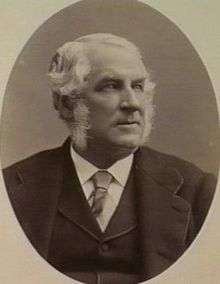George Raff
| George Raff | |
|---|---|
 | |
| Member of the Queensland Legislative Assembly for Town Of Brisbane | |
|
In office 11 May 1860 – 8 April 1864 | |
| Preceded by | New seat |
| Succeeded by | William Brookes |
|
In office 23 November 1865 – 22 June 1867 | |
| Preceded by | Charles Blakeney |
| Succeeded by | Alexander Pritchard |
| Personal details | |
| Born |
George Raff 6 April 1815 Forres, Elginshire, Scotland |
| Died |
28 August 1889 (aged 74) Brisbane, Queensland, Australia |
| Resting place | Toowong Cemetery |
| Nationality | Scotland |
| Spouse(s) | Harriet Sealy (m.1843 d.1880), Eliza Jane Molle (m.1883) |
| Relations | Alexander Raff (brother) |
| Occupation | Grazier |
| Religion | Presbyterian |
George Raff (15 April 1815—28 August 1889) was a merchant, sugar grower and politician born in Forres, Morayshire, Scotland who spent a substantial part of his life in Australia.[1]
Born to James Raff, a farmer and peasant, and Margaret Raff, née Cumming, little is known about Raff's early years. He left for Sydney aboard the Earl Durham, and arrived on 2 January 1839. Soon after arriving, he found employment with Lamb, Parbury & Co., founded by John de Villiers Lamb and his brother.[2] He remained there, with that employment, for several years, before, in 1842-1843, he held Tarwin station, Gippsland. Around that time, on 14 April 1843, Raff married Harriet Sealy, daughter of Robert Bourne, a retired missionary whom he knew and was associated with in Gippsland.[1]

In January 1851, Raff returned to Australia, and then moved to Brisbane, Queensland. Soon thereafter he founded both the George Raff & Co., and, a short time later, the Queensland Mercantile and Agency Co. He worked with both of these companies for ten years, before he became director of the Queensland Steam Navigation Co. Because of his close involvement with these significant enterprises, Raff was the main substantiator of the wool trade between Brisbane and London.[1]
At a plantation in close proximity to Caboolture, he began to work with the growing and harvesting of sugar, among other crops, and became involved with commercial sugar production. He was also commended for his treatment of the Kanaka men he employed on the site by John Dunmore Lang.[1]
Raff became politically involved in the separation movement. On 11 May 1860 he was elected to represent the Town of Brisbane[3] in the first proper parliament, also in 1860 he became a part of the Board of National Education and of the Exhibition Commission. Following the resignation of Arthur Macalister as premier in July 1866, the government that he was a part of was under threat of becoming utterly dysfunctional. To keep the government alive, Sir George Bowen offered to create a temporary committee with Sir Robert George Wyndham Herbert and Raff, a move which was met with strong opposition. Raff continued to work in politics and parliament until 22 June 1867,[3] when he resigned. While Raff was a political liberal, his strong opposition to extravagance in politics and in government rendered him suspect in several circles, but his good will and patriotism was never denied openly.[1]
Personal life
Raff lived a happy social life with his family (wife and seven sons) at his house in New Farm, until the death of his wife in 1880.[4] Approximately four years later he married again, to Jane Molle, née Lord. Molle was a widow and she had children of her own. This led to Raff's effective estrangement from his sons.
Raff died on 28 August 1889 and was buried in Toowong Cemetery.[5] He was survived by his seven sons and left an estate valued for probate at £5038.[1]
Notes
- 1 2 3 4 5 6 Hall, Noeline V. "Raff, George (1815–1889)". Australian Dictionary of Biography. Canberra: Australian National University. Retrieved 16 July 2013.
- ↑ G. P. Walsh, 'Lamb, John de Villiers (1833–1900)', Australian Dictionary of Biography, Volume 5, Melbourne University Press, 1974, pp 55-56. Retrieved on 17 October 2007
- 1 2 "Alphabetical Register of Members of the Legislative Assembly 1860–2012 and of the Legislative Council 1860-1922" (PDF). Parliament of Queensland. Retrieved 16 July 2013.
- ↑ "Classified Advertising.". The Brisbane Courier (National Library of Australia). 29 November 1880. p. 1. Retrieved 26 January 2015.
- ↑ Raff George — Brisbane City Council Grave Location Search. Retrieved 26 January 2015.
| Parliament of Queensland | ||
|---|---|---|
| New seat | Member for Town Of Brisbane 1860–1864 |
Succeeded by William Brooke |
| Preceded by Charles Blakeney |
Member for Town Of Brisbane 1860–1864 |
Succeeded by Alexander Pritchard |